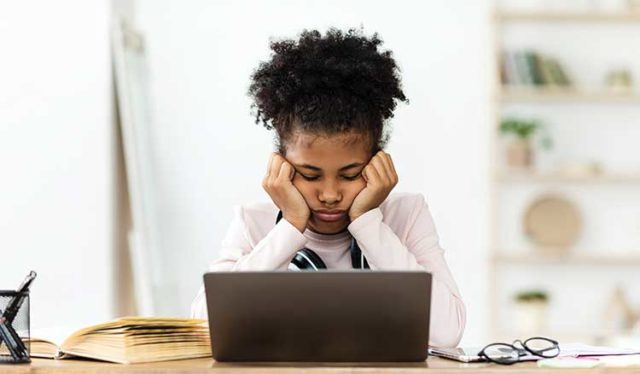We are a month into the new year and already 2022 feels like Groundhog Day. While I am trying to stay positive and optimistic, it is the kids whose patience and resiliency seem to be waning most. The vaccines brought us hope and the promise of a return to normal life, and that did happen to an extent, but then the variants arrived and left even the vaccinated and boosted vulnerable. This rollercoaster ride of a pandemic has taken a toll on all of us in different ways. For children, it has taken an academic and mental toll. They are exhausted from the uncertainty, the isolation, and the disruptions. Long term, the “side effects” of Covid may be worse than the virus for many children.
Here are some tips to identify those effects and how to help your child.
BEHAVIOR CHANGES
In talking with many teachers and school counselors, I don’t think they were quite prepared for the onslaught of behavioral issues they would see returning to in-person learning. There has been an increase in disruptive behavior, playground violence, and stronger emotional responses like crying or meltdowns over small issues.
We recently realized that some of our frustrations with our 9-year-old’s behavior were due to sports being postponed or canceled for another season, having to wear masks again at recess, and a general fear that at any moment he would be back to Zoom learning. It affected his sleep, his home behavior, and his overall mood. As a result, we have started a nightly check-in where he can rate how he is feeling about different life aspects— school, family, sports, Covid, and so on. We all participate in this check-in, and it has helped us all identify what is causing us the most stress or anxiety and to talk more openly as a family about how we are feeling. Being self-aware of how your mood or mental health is affecting your behavior and others around you can be a powerful tool to instill in our children.
INCREASED SCREEN TIME
It would be tough to find a parent who wouldn’t say their child’s screen time increased during Covid. This was partly a result of most schools moving to online instruction. There also was a long period of time without school, sports, and other activities, so children turned to their screens and social media. Research shows large amounts of time swiping and scrolling can lead to feelings of self-doubt, worthlessness, anxiety, and depression.
So what can we do? Screens and social media aren’t going away, so parents must remember to check in — how much time are they spending on what apps or websites, and is it affecting their mood, sleep, or other activities they enjoy? It’s also always good to engage with them as much as you can, so make that TikTok with them, watch a movie together, or ask for a tutorial on the latest Snapchat filters.
LEARNING GAPS
Many students are still struggling to catch up from the massive learning loss that occurred during the first year of the pandemic; however, it is still unclear how or even if they will catch up. We all want life to return to “normal,” but not to acknowledge the losses kids have experienced academically and personally would be shortsighted for parents and educators.
We are at a time where we can fix problems that have been broken in our schools for years, such as inadequate resources for counseling. Our kids are just trying to be normal kids, so it is important to acknowledge the toll that fear, anxiousness, constant Covid testing, and the ever-changing Covid rules have taken on them. As parents, we need to rethink the expectations we have of our kids, because they are managing a lot. I think schools would benefit from doing the same. We need to make sure our teachers are supported and that the school district is prioritizing the issues that matter most to students and parents right now. Unfortunately, in San Francisco this has not been the case, but we have a chance in February to make our voices heard at the ballot box with the recall of three school board members.
Since the holidays, the number of Covid cases in kids has skyrocketed. For those who were vaccinated, the virus was mild, others tested positive with no symptoms. However, the emotional strain of Covid reemerged for many of our children. If you saw it in your children, you are not alone. We saw it manifest in different ways with all three of our children. We can’t ignore it; we need to acknowledge it and help them. My 9-year-old said it best when he recently declared at dinner, “I am so over Covid!” Aren’t we all?
Email: [email protected]




